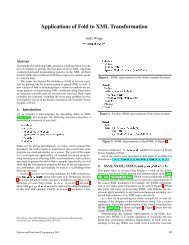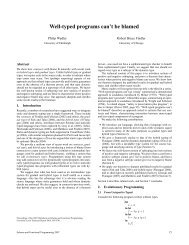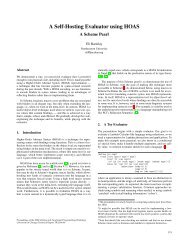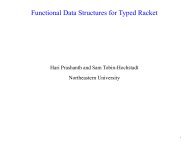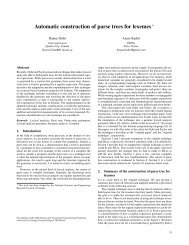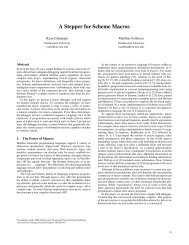2006 Scheme and Functional Programming Papers, University of
2006 Scheme and Functional Programming Papers, University of
2006 Scheme and Functional Programming Papers, University of
Create successful ePaper yourself
Turn your PDF publications into a flip-book with our unique Google optimized e-Paper software.
the value <strong>of</strong> the %eax register by 4 (the shifted value <strong>of</strong> 1). The machine<br />
instruction that performs addition/subtraction is addl/subl.<br />
(define (emit-expr x)<br />
(cond<br />
((immediate? x)<br />
(emit "movl $~a, %eax" (immediate-rep x)))<br />
((primcall? x)<br />
(case (primcall-op x)<br />
((add1)<br />
(emit-expr (primcall-oper<strong>and</strong>1 x))<br />
(emit "addl $~a, %eax" (immediate-rep 1)))<br />
...))<br />
(else ...)))<br />
The primitives integer->char <strong>and</strong> char->integer can be<br />
added next. To convert an integer (assuming it’s in the proper<br />
range) to a character, the integer (already shifted by 2 bits) is<br />
shifted further 6 bits to make up a total <strong>of</strong> char-shift, the result is<br />
then tagged with the char-tag. Converting a character to a fixnum<br />
requires a shift to the right by 6 bits. The choice <strong>of</strong> tags for the<br />
fixnums <strong>and</strong> characters is important for realizing this concise <strong>and</strong><br />
potentially fast conversion.<br />
We implement the predicates null?, zero?, <strong>and</strong> not next.<br />
There are many possible ways <strong>of</strong> implementing each <strong>of</strong> these predicates.<br />
The following sequence works for zero? (assuming the<br />
value <strong>of</strong> the oper<strong>and</strong> is in %eax):<br />
1. cmpl $0, %eax<br />
2. movl $0, %eax<br />
3. sete %al<br />
4. sall $7, %eax<br />
5. orl $63, %eax<br />
Line 1 compares the value <strong>of</strong> %eax to 0. Line 2 zeros the value<br />
<strong>of</strong> %eax. Line 3 sets %al, the low byte <strong>of</strong> %eax, to 1 if the two<br />
compared values were equal, <strong>and</strong> to 0 otherwise. Lines 4 <strong>and</strong> 5<br />
construct the appropriate boolean value from the one bit in %eax.<br />
The predicates integer? <strong>and</strong> boolean? are h<strong>and</strong>led similarly<br />
with the exception that the tag <strong>of</strong> the value must be extracted (using<br />
<strong>and</strong>l) before it is compared to the fixnum/boolean tag.<br />
3.4 Binary Primitives<br />
Calls to binary, <strong>and</strong> higher-arity, primitives cannot in general be<br />
evaluated using a single register since evaluating one subexpression<br />
may overwrite the value computed for the other subexpression. To<br />
implement binary primitives (such as +, *, char




